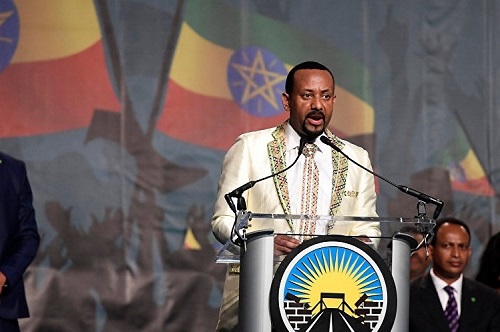Reuters photo
By
Alem Hailu G/Kristos
Exploiting ethnicity-permeated politics, and coming from a jungle after picking arms to combat and oust a despot, many had secured a niche in the Ethiopian government’s administrative machinery, in most cases efficiency and merits being downplayed.
It was thirsty of democracy and equitable wealth distribution and the combatants took to the forest. But ironic as it may sound, no sooner had they come to power, making a 180 degree turn, they themselves began siphoning the country’s modest income to line up their pockets. In a short period of time they made tycoons of themselves.
It is not hard to surmise how such a nation’s wealth, derived from an economy heavily leaning of agriculture, could have been devoted to irrigate flagship projects chalked out to unchain millions from a debilitating penury.
Covertly, they were stifling democracy which entails questions about equitable distribution of wealth. The lack of accountability, which could have been dragged into the light for public scrutiny through investigative journalism, had become a folly no longer seen with a raised brow. In so far as the corrupt launder embezzled money, s/he was considered smart even by politicians at the helm of authority. Devoting such money to construct towers was also seen as a worthwhile investment venture. Those who assumed power through their ethnic line and affiliation becoming businesspersons were knocking out market tradesmen laboring to rise up by a shoestring, the latter groaning under a market permeated by cut-throat competition.
Due to the aforementioned tragic scenarios, the chasm between the haves and have nots was ever widening to the extent of stirring up nonstop riots against and disobedience to the government. The corrupt did form a class. Frequenting Hotels decorated with stars, they were averse to brushing shoulders with common people, anxious about a daily bread. Cruel as they were, it never occurred to them to find ways that would allow benefits to accrue to poor people even from their ethnic line, whom they tried to remember on a rainy day. There was no reason such people gave them protection with the belief blood is thicker than water.
The tragic-scenario-reversal move of the reformed government though tardy incoming was much appreciated and embraced by the citizenry. The political wind wafting nationwide is carrying across the message taht vampires will be combed out with a fine tooth comb and a genuine democracy will reign supreme.
But as the saying goes, ‘an insult to an injury’, when prohibited from indulging in improprieties, they are making a frantic bid to re-establish the status quo. Instead of getting off the scene to placate public grievance, barefaced they try to square face citizens on the significance of the politics that exhibited decadence. Under the smokescreen of questions of rights they orchestrate clashes among different ethnic groups lavishly outlaying the wealth amassed by foul means; wealth that could buy an empire. Needless to say, unless a snake is defanged, taking it into one’s arms is fatuous!
Of course, they may manage to efface the footmark of corruption in the sand. But as the saying goes ‘It is not possible to hide oneself stealing a camel!’ Holding them accountable for their misdeeds is not out of the domain of possibility.
Bringing into play a commission of inquiry is possible to study their cases. After carefully selecting impartial, experienced, selfless and nationalist inquiry commission members, it is possible to study cases of victims, who suffered the brunt side of the stick. Tangible evidence will be collected to start legal procedures against those leeching and disturbing the tranquility of the country as well as covertly and overtly shedding the blood of innocent civilians.
Parallel to this, transforming the country’s politics from ethnicity-charged to one socioeconomic-focused is imperative. The commission of inquiry to be established could be of much help in this regard not forgetting the think-tank group the country plans to bring into life opening wide its doors to competing parties.
Alem Hailu G/Kristos
A published poet, novelist, editor, translator of masterpieces, literary critic, playwright and journalist from Ethiopia. M.A holder in literature, Addis Ababa University.
Looking for a traditional publisher of a collection of poems. My novel: ‘Hope from the debris of hopelessness’.



No Comments Yet!
You can be first to comment this post!